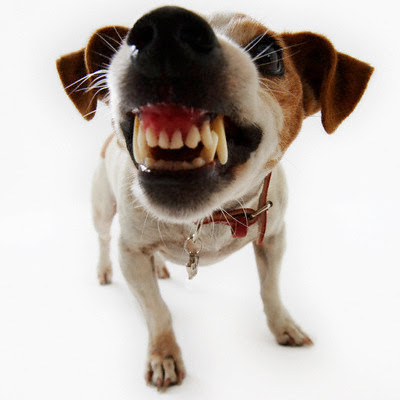
This is how a Jack Russell Terrier smiles.
The cover of the February issue of Veterinary Economics features an article entitled Pearly White Profits in which veterinarians are advised that canine and feline dentistry are great profit centers.
Tips are given on how to get the receptionist to
The article says everyone in the practice should "make a list of the top 10 things you can do to increase the number of dental procedures your practice performs."
Right.
But you know what this article never says or even suggests? That there is any scientific evidence to support the notion that there is any medical benefit to annual teeth cleaning.
Absolute silence there!
And you know why? Because no such evidence exists.
And, here's the kicker: that's not just true for dogs, it's true for humans too. As the Journal of Evidence-based Dentistry notes, there is "insufficient evidence to understand the effect of routine scaling and polishing".
And that's for humans. For dogs?
Well, do you really need to know which way the wind blows?
Think it through for a minute. What's the main difference between the teeth of a human and the teeth of dog?
That's right! The human can be expected to live 80 years with adult teeth, while the dog will generally be dead after 12 or 13 years.
But there's more.
You see, human teeth cleaning can be done with the human wide awake and sitting up in a chair, while canine dentistry has to be done with the dog completely knocked out under general anesthesia.
That's a big difference!
And the reason that's a big difference is that anesthesia is risky for both humans and dogs.
In fact, complete general anesthesia is so unsafe that today, when a human heart stent is put in, the patient is almost never put completely under. The sames is true for laser eye surgery, most small tumor removal, and carpal tunnel surgery.
In fact, veterinary anesthesia is so dangerous your vet will insist on doing a full run-up of blood tests before it is done, and even then anesthesia complications and fatalities are fairly common.
And yet, your vet cannot show you a single scientific study that shows that dental scaling and polishing on a dog or cat has the slightest medical benefit.
Not one.
Bottom line: Annual teeth cleaning is not about canine health care, it's about veterinary wealth care.
The entire field was invented, approximately 20 years ago as a way of bringing more money into veterinary practices to replace money disappearing because of changing vaccine protocols for dogs and cats.
Go ahead and brush your dog's teeth. Home-based prevention is good medicine. But when it comes to an annual dental cleaning at the vets, just say NO.
Does that mean there is no place for canine dentistry? No, not at all. I recommend taking in a dog when it's about five years old for a teeth cleaning, and then again when it's about 10. The cost is high, and the benefits are not clear, but a good scaling of the teeth may make them look a little better and may reduce doggy breath a bit (but do not count on much change on either score).
.
No comments:
Post a Comment